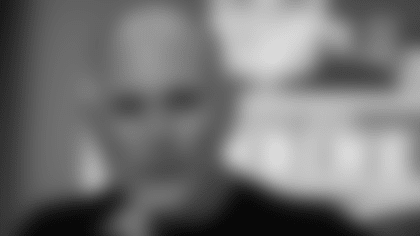When Calais Campbell speaks, people listen. He is the NFL's reigning Walter Payton Man of the Year, and his voice is deeper than the Grand Canyon.
Athletes have drawn attention to social injustice and racism this week by refusing to play games and speaking out on issues. While not playing is an effective way to make a statement, Campbell also believes that when you continue to play and win, it gives you a strong platform.
That's Campbell's plan for this season. Help the Ravens win the Super Bowl and continue to work for social justice along the way.
"I can't speak for everybody on this one, but I feel like our voice is stronger when we're on the field," Campbell said. "And our voice is stronger if we can play well enough to be in that last game in February. I feel like that's when our voice is strongest."
This has been an eventful week in the sports world, and the Ravens held a lengthy team meeting following Thursday's practice as the organization continued its proactive stance in the battle for social justice.
The Ravens issued a statement Thursday that detailed steps the organization will take to combat racism and social injustice.
Campbell has yet to play a snap for the Ravens after being acquired in a trade with the Jacksonville Jaguars this offseason. But he's already a team leader. His credentials as a five-time Pro Bowl defensive end speak to his talent. His dedication to making an impact off the field speaks to his character. Joining the Ravens exposes him to the kind of atmosphere he embraces.
"This organization is special," Campbell said. "Having the ability to be able to make a statement from the players and coaches. There were a lot of players speaking up. I remember talking to Tony Jefferson when I was trying to figure out if this trade was going through. He was like, 'I'm very excited you'll get to experience being a Raven.' I know what he means."
Campbell's life story is inspirational as one of eight children in his family. During a six-month period in high school, his family lived in a homeless shelter in Denver. He knows struggle. He knows that society's issues are complex. But he believes this country can do a better job of closing the racial divide.
"I love all people," Campbell said. "I love police officers. I love America.
"Right now in our country, there are some natural biases and some stigma on the Black community. A lot of this comes from poverty. In the Black community there's a lot of healing that needs to take place. Trauma passed down from generations, from slavery, from all the oppression we've felt over the years. We want to draw a line in the sand and start making some change."
The regular season opener against the Cleveland Browns (Sept. 13) is about two weeks away, and Campbell can sense his body clock getting ready for the season. But he has never viewed himself as just an athlete. He looks at life from a broad perspective and takes his role as one of the league's most influential players very seriously.
That's the mindset he is bringing to his new team, and to these significant times. Campbell has always wanted to win a championship, and he has always wanted to make a difference. So why not do both this season?
"I truly believe that God gave me the ability to play football to inspire people and to really use these gifts to make the world a better place," Campbell said. "I feel like it's my duty to really stand for what I believe in. So, when I see so much pain and oppression in the world, especially in the Black community, I feel like if it's not us, if it's not me, then who is it?
"I can continue to learn and continue to figure out my viewpoint and what I want to say as I go along, but I can't wait for tomorrow. It's too important. It has to be now."



















